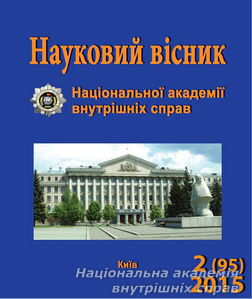International experience and problems of cleaning power in Ukraine
Keywords:
cleaning power, property lustration, tax amnesty, lyustratsiyna test, standard cleaning power
Abstract
Actuality of research. Problems of power clearance arose in all the countries that fell under the influence of totalitarian regimes. Each country has chosen its path and methods of power clearance to ensure democratic values in the country and the rule of law. In Ukraine process of power clearance lasts for a year, and during application of the relevant law, a number of problems and contradictions emerged, that require immediate resolution. The purpose of the research – to conduct analysis of international experience of power clearance and development of recommendations on improving of the process of lustration in Ukraine, based on the research. The main material. In modern science, the term lustration (from late Latin. Lustratio – purification through sacrifice, atonement) is used to indicate special review procedures of persons who after the change of the country’s totalitarian regime to a democratic occupy government posts included in the special list, and candidates for these positions on the subject of their cooperation in the past (till the change of the country’s authorities) with state security bodies. Ukrainian lawmakers went their own way, defining lustration as established by law or court order prohibition for certain individuals to occupy certain positions (stay on service) (except for elective offices) in state bodies and local government. Thus, Ukrainian legislator decided to apply the procedure of lustration to two large groups of persons, who at different times of Ukrainian history took certain categories of positions or carried out unlawful activities. There are reasons to consider that for the ensuring of transparency and legitimacy of lustration procedures, in addition to the Commission on power clearance, supervision over this procedure should be also carried out by prosecutor’s office. Whereas the Law of Ukraine d.d. 02.12.2015 the system of the prosecutor’s bodies has been supplemented by a new element – Specialized anti-corruption prosecutor’s office, it is expedient to ascribe to its competence control over law abidance during lustration procedures, as well as inactions of government bodies as for power clearance. It is necessary to fix the legal responsibility of heads of state bodies who do not fulfill the law «On power clearance», ignore their duties to conduct lustration inspections. In the case of systematic failure to fulfill their duties, heads of state bodies shall be exempted from their positions and subjected to lustration inspection. Consequently (taking in consideration the expansion of corruption in Ukrainian society) lustration procedure itself will only change the players on corruption arena. The real shift will be only possible when the power clearance is accompanied by extensive events of legal propaganda. Conclusions. The Law of Ukraine «On power clearance» is not without flaws, including significant, but lustration is needed for modern Ukrainian society to implement the democratic ideals for which «Revolution of dignity» was carried. Lustration is a fundamentally new phenomenon in the Ukrainian legal system and for this very reason it is not completely consistent with existing legal rules, but these rules led to the corruption collapse, so lustration is quite logical and reasonable way to get out of the crisis. This law is supported by the community since social activity in most cases has a decisive impact on the lustration of certain civil servants and the lustration process in general.Downloads
Download data is not yet available.
Abstract views: 80 PDF Downloads: 333
How to Cite
[1]
Trepak, V. 1. International experience and problems of cleaning power in Ukraine. Scientific Herald of the National Academy of Internal Affairs. 95, 2 (1), 236-249.
Issue
Section
Іnternational experience
- Authors reserve the right to authorship of their own work and transfer to the magazine the right of the first publication of this work under the terms of the Creative Commons Attribution License, which allows other persons to freely distribute published work with mandatory reference to authors of the original work and the first publication of an article in this magazine.
- Authors have the right to enter into separate additional agreements on non-exclusive dissemination of the work in the form in which it was published in the journal (for example, to post an article in the institution's repository or to publish as part of a monograph), provided that the link to the first publication of the work in this journal is maintained.
- The journal's policy allows and encourages the posting of articles by authors on the Internet (for example, in electronic storehouses of institutions or on personal websites), both before the submission of this manuscript to the editorial office and during its editorial processing, as this contributes to the creation of a productive scientific discussion and positively affects the efficiency and dynamics of citing the published work.




